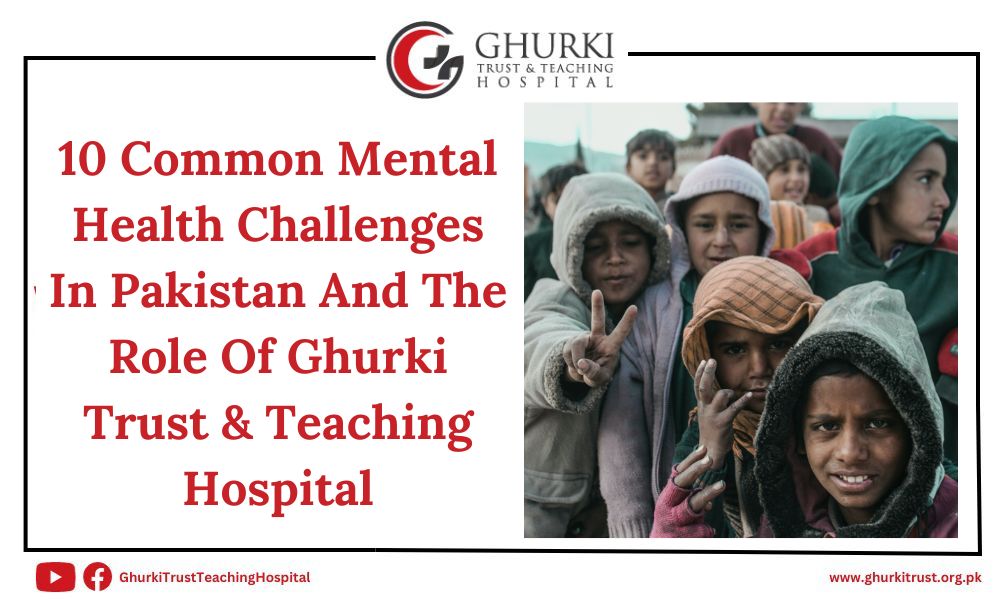10 Common Mental Health Challenges In Pakistan And The Role Of Ghurki Trust & Teaching Hospital

In Pakistan, a nation with over 241.5 million people, mental health issues are frequently shrouded in shame and silence. Despite affecting a significant portion of the population, these issues often remain unaddressed and unresolved. This blog post aims to shed light on the critical need for improved mental healthcare by exploring the various aspects of this issue. By examining the effective programs at Ghurki Trust & Teaching Hospital, a renowned mental health center in Pakistan, this piece seeks to increase awareness, understanding, and practical solutions to the ongoing mental health challenges in the country.
The Dimensions Of The Mental Health Challenges In Pakistan
Mental health concerns are alarmingly widespread in Pakistan. According to the World Health Organization (WHO), an estimated 45.5 million people suffer from mental disorders, with depression, anxiety, and schizophrenia being the most common. However, only 10% of individuals with mental illness receive any form of treatment due to various factors that are also detected in Pakistan:
- Stigma: Deeply ingrained societal stigma surrounding mental illness discourages individuals and families from seeking help, fearing judgment and discrimination.
- Lack of awareness: Limited understanding of mental health issues creates misconceptions and prevents people from recognizing symptoms in themselves or others.
- Inadequate resources: Pakistan’s healthcare system faces a severe shortage of qualified mental health professionals, accessible facilities, and affordable treatment options.
- Limited access: Particularly in rural areas, geographical barriers and lack of transportation make it difficult for individuals to reach mental health services.
Understanding The 10 Common Mental Health Challenges In Pakistan
In Pakistan, where mental health problems are often hidden by shame and ignored, it is still very important to find and deal with these problems. Ten common mental health problems still exist and make it hard for many people to get the care they need:
| Depression: | Affects nearly 17 million, exacerbated by poverty, unemployment, and social isolation. |
| Anxiety: | Gripping over 12 million, characterized by excessive worry and physical symptoms, with prevalent social and generalized anxiety disorders. |
| PTSD: | Widespread due to natural disasters and social unrest, impacting daily life and relationships. |
| Substance Abuse: | About 6% struggle, and they often use drugs as a way to deal with their problems, which is a problem with opioids and cannabis. |
| Eating Disorders: | Rising, especially among young women, linked to societal pressures and unrealistic beauty standards. |
| Childhood Disorders: | Undiagnosed ADHD, ASD, and childhood depression due to a lack of awareness and specialized services. |
| Perinatal Mental Health: | Affecting mothers and fathers, exacerbated by a lack of support systems and awareness. |
| Mental Health in Older Adults: | Prevalent among seniors due to health issues, social isolation, and inadequate care facilities. |
| Underserved Communities: | Limited access in rural areas and marginalized populations, compounded by geographical barriers, poverty, and cultural stigma. |
| Suicide: | A rising concern, particularly among the youth, fueled by stigma, limited access to help, and pervasive hopelessness. |
This straightforward explanation is an appeal for unity to face these challenges, stop making mental health a subject of shame, and create a caring space where everyone can get the care they deserve.
Ghurki Trust & Teaching Hospital Stands Forth To Tackle These Challenges
Ghurki Trust & Teaching Hospital stands as a beacon of hope for individuals struggling with mental health challenges in Pakistan. The hospital provides comprehensive mental healthcare services, including
- Outpatient and inpatient care: Offering individual and group therapy, medication management, and psychosocial support in a safe and supportive environment.
- Community outreach programs: Raising awareness about mental health, reducing stigma, and providing accessible services in underserved communities.
- Training and education: Equipping healthcare professionals with the knowledge and skills to effectively diagnose and manage mental health conditions.
- Research and advocacy: Contributing to the development of evidence-based practices and advocating for stronger mental health policies.
Bottom Line
As Ghurki Trust continues its dedicated efforts, the journey towards accessible and quality mental healthcare for all in Pakistan progresses, offering a promising future free from stigma and filled with the necessary support for individuals to lead fulfilling lives. In this season of giving, we invite you to contribute to this noble cause during Ramzan. Your donation can help expand these vital services, ensuring that more individuals receive the care they need. Let’s come together to make a difference and provide hope and healing to those affected by mental health challenges.
FAQs
Q1 – Why is mental health overlooked in Pakistan?
Mental health stigma and lack of awareness contribute to the oversight.
Q2 – What challenges hinder mental health care in Pakistan?
Challenges include stigma, lack of awareness, inadequate resources, and limited access.
Q3 – How prevalent is depression in Pakistan?
Nearly 17 million people are affected, worsened by poverty and social isolation.
Q4 – What services does Ghurki Trust & Teaching Hospital offer?
They provide outpatient and inpatient care, community outreach, training, and research.
Q5 – Why is stigma a significant barrier to mental health care?
Stigma discourages seeking help, fearing judgment and discrimination.
Q6 – How does Ghurki Trust contribute to mental health advocacy?
The hospital advocates for stronger policies and contributes to evidence-based practices.
Q7 – What steps can individuals take to support mental health in Pakistan?
Support includes breaking stigma, raising awareness, and encouraging access to mental health services.

